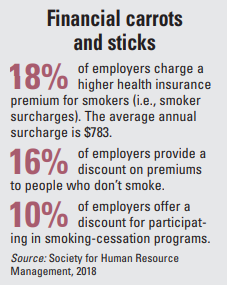Some of your employees may be a month into their New Year’s resolution to quit smoking. But what if you, as an organization, wanted to kick the habit in a different way— by refusing to hire employees that smoke?
It’s a growing trend among organizations that want to inject a healthier culture and cut down on their health care costs. The CDC says cigarette smoking is the leading cause of preventable disease and death in the United States, yet about 34 million adults (nearly 14%) still currently smoke.
But such a tough no-nicotine hiring stance isn’t available for every employer. In fact, more than half the states have laws that protect smokers from being discriminated against by employers because of their nicotine use (see box at right).
And even if you can ban smokers from your staff, you may still want to consider other options that incentivize workers who pursue healthy behaviors, not punish workers who don’t.
U-Haul’s new ban
This isn’t a new idea. Several employers—particularly hospitals and other healthcare businesses—have set no-nicotine hiring policies for years.
Most recently, starting Feb. 1, the U-Haul corporation will no longer hire nicotine users in the 21 states where it is legal to create such bans. Applicants at U-Haul will now be told of the policy and, in states where testing is allowed, candidates must consent to submit to future nicotine screenings to be considered for a job.

Source: The HR Specialist
“Nicotine products are addictive and pose a variety of serious health risks,” a U-Haul spokesman said. “This policy is a responsible step in fostering a culture of wellness.”
How far can you go?
On the federal level, no law directly tackles such employer bans on smokers. But some laws restrict how you can enforce such a ban.
That’s why it’s important for employers who plan to ban smokers to enforce their rules uniformly. Unfairly targeting women, minorities, disabled people or workers over age 40 could turn your smoking ban into a legal smoking gun by running afoul of federal anti-discrimination laws. Be able to show that your ban is being instituted for business necessity and is enforced consistently.
So if your state law permits, employers can implement a ban on off-the-clock smoking. But while the practice may be legal in 21 states, it’s still not a popular choice among employers. And you also need to weigh the impact of a smokers ban on recruitment, retention and public relations.
Until the “no smokers” movement becomes more mainstream, it may be best to weight these points:
- Consider your industry and locality. If you work for a healthcare company or an education institution, for example, a no-smokers policy may make sense. It may be unrealistic in other industries or locations. Also, workplaces covered by collective-bargaining agreements may face other restrictions.
- Don’t single out employees. Refusing to hire new workers who smoke is one thing, but be wary of terminating current staff because they smoke, even if your state allows it. That could still spark a lawsuit based on invasion of privacy or other law. And even if you win, it would be costly and disruptive.
- Offer incentives and assistance. This kinder, gentler approach includes all types of incentives to encourage healthy behaviors, including smoking-cessation classes, payment for nicotine patches (or meds), discounts on health premiums and even cash rewards.
Several years ago, General Electric found that offering up to $750 in cash incentives led to three times as many people successfully quitting after six months compared to a control group.
Beyond those carrots, consider using the stick of assessing increased health insurance premiums on those employees who smoke.
Source: The HR Specialist, February 2020 |